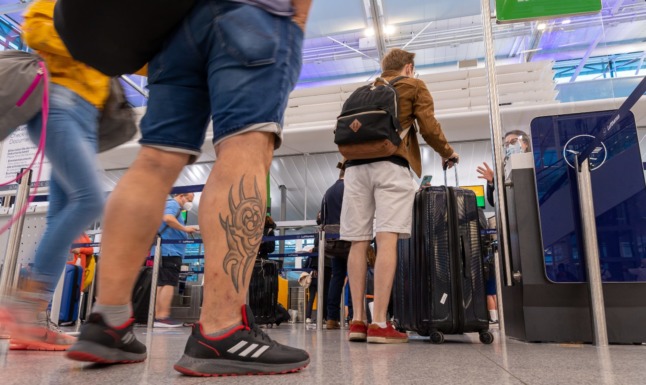What’s happening?
The UK government announced late on Wednesday last week that Germany was being put on the so-called “green” list of countries under its traffic light system for arriving travellers.
It further eases the entry rules for arrivals coming to England. Scotland, Northern Ireland and Wales announced later that they would implement the changes.
Along with Germany, Austria, Slovenia, Slovakia, Latvia, Romania and Norway were also added to the green list.
The changes came into force at 4am on Sunday, August 8th. Those who arrived in the UK before this point face the amber country rules.
READ ALSO: UK adds Germany, Austria and Norway to green list
We're making some changes to our travel lists🚦
Firstly, we’re removing the quarantine requirement for fully jabbed travellers coming back from #France.
At the same time, we’re adding key destinations ☀️ Germany, Austria, and Norway to the Green List 🟢[1/3]
— Rt Hon Grant Shapps MP (@grantshapps) August 4, 2021
What does being on the green list actually mean?
People coming from green list countries to the UK do not have to quarantine – even if they are unvaccinated against Covid. But they still have to book and do a Covid-19 test before arriving in the UK and on or before day two of being back in the country.
What does it mean for fully vaccinated people?
The government late last month eased the rules to allow people from amber countries like Germany who were fully jabbed with a vaccine approved by regulators in the EU and in the US to enter the UK without having to quarantine.
This followed a decision earlier in July that only allowed people vaccinated in the UK under the NHS system to avoid quarantine if coming from amber countries – but not British residents living abroad who received their jabs in their new country.
READ ALSO: ‘Troublesome but possible’ How Brits in Germany feel about going home now quarantine rules are eased
That means that Germany becoming a green list country doesn’t really change anything for people who fall into those categories.
Since the start of this week they’ve already been able to avoid a quarantine period and do the day two test after arrival.
So the biggest change is that it opens up quarantine-free travel to unvaccinated people in Germany.
The Our World in Data chart below shows the daily number of Covid cases in a selection of countries compared to Germany.
What should I know about tests?
As we wrote in a recent explainer about UK/Germany transport rules, travellers will still need to take either an antigen or PCR test – regardless of their vaccination status – before departing for the UK and a PCR test on or before the second day after they arrive. PCR testing is costly in the UK.
The test for arriving in the UK has to meet the performance standards of ≥97% specificity, ≥80% sensitivity at viral loads above 100,000 copies/ml. Most test centres in Germany will say on their website whether they can meet these standards.
Children aged 10 and under do not need to take a test for travelling to the UK, and children aged 4 and under are exempt from tests after arrival. You can find more details on rules on testing here.
There are also some other exemptions for tests – for example if you are going to the UK for urgent medical treatment.
According to the UK government, under-18s are exempt from isolation.
Everyone arriving in the UK has to register on the passenger locator form.
Are people in Germany allowed to travel to the UK?
Yes, Germany has not banned any travel from the country. But the UK is classed as ‘high incidence’ by Germany’s Robert Koch Institute, meaning that there is a travel warning.
The Foreign Office says: “A travel warning is an urgent appeal not to undertake unnecessary trips. The travel warning is not a travel ban. Travellers decide at their own risk whether to go on a trip.”
What about driving to the UK from Germany?
That is easier now that France has been downgraded in risk status by the UK – but may have implications if you are not vaccinated.
France was on on the ‘amber plus’ list due to fears over the Beta strain of Covid-19 which meant meant travellers from France to the UK still had to quarantine for 10 days even if fully vaccinated.
From 4am on August 8th, France moved to the amber list which means fully vaccinated people won’t have to do the 10 day quarantine. If you’re travelling through France, though, the amber rules will apply even if you’re coming from a green list country like Germany or Austria.
The UK government says: “If you are travelling to England in a private vehicle, the rules of the countries and territories you drive through apply. For example, if you drive through an amber list country, then you must follow the amber list rules when you arrive in England.
“This applies whether you stop in the country or territory or not. You need to record the countries and territories you drive through on your passenger locator form.”
What are the other changes to the UK’s travel rules?
As well as the changes we’ve mentioned above, there are a few other countries shifting around on the traffic light system of the UK.
Despite speculation that restrictions on Spain would be tightened, it stays on the amber list.
India, Bahrain, Qatar and the UAE have been moved to amber after being on the red list, which requires a costly 10-day hotel quarantine on arrival.
Meanwhile Georgia, Mexico, and France’s Indian Ocean territories of La Reunion and Mayotte have been moved onto the red list.



 Please whitelist us to continue reading.
Please whitelist us to continue reading.
Member comments